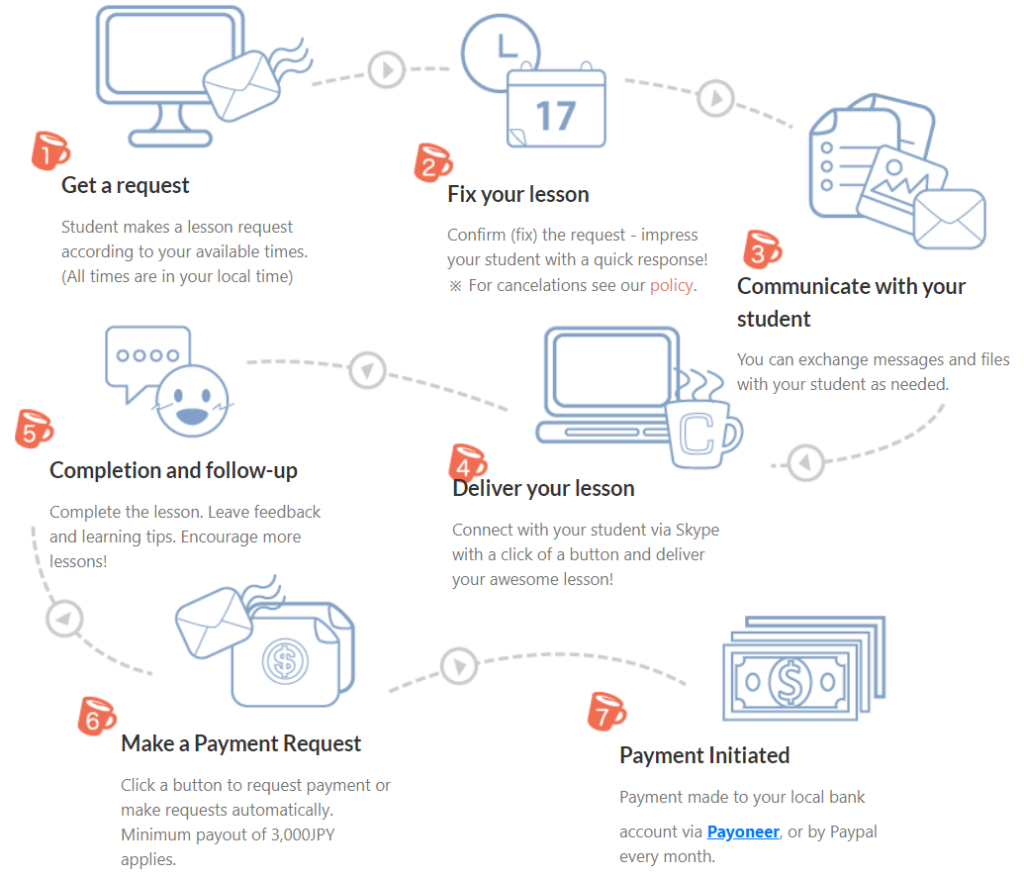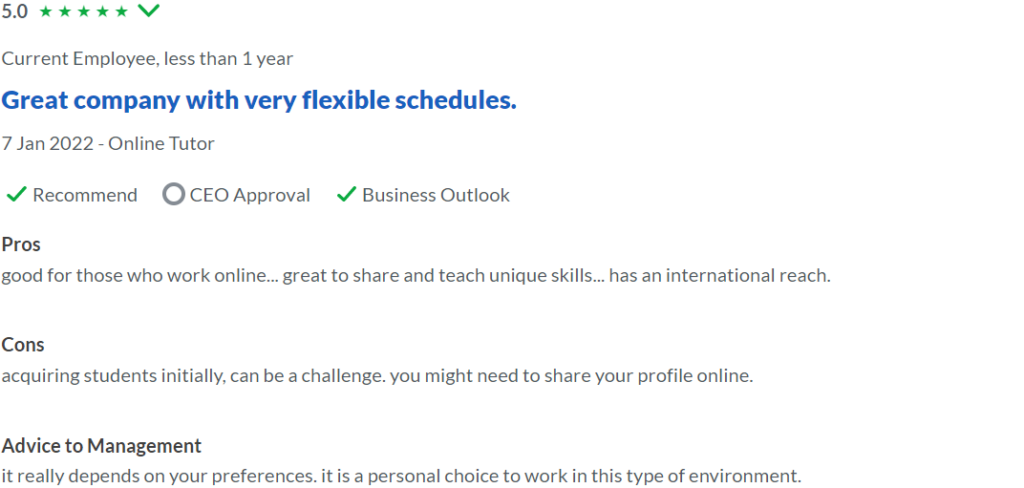Table of Contents
Cafetalk Review Summary
Cafetalk is a teacher marketplace where almost any subject can be offered to Japanese (mostly adult) students. You must be a Native speaker in the language of instruction with a degree. Classes are 1v1, you decide the length and price, though Cafetalk retains a 15-40% commission and gaining bookings can be challenging.
| Pay (per hour): | $8-$36 |
| Native / Non-Native Speakers accepted? | Native* |
| TEFL / TESOL / CELTA required? | No |
| Degree / diploma required? | Yes |
| Adult / child students? | Both** |
| Class size: | 1 |
| Minimum hours (per week): | 0 |
**mostly adults
Cafetalk Pros and Cons
Pros:
- Relatively quick, simple and easy application and interview, with no mock lesson
- Wide range of subjects can be taught, not limited to languages
- Freedom to decide own schedule and lesson plan/length, with no minimum or set hours
Cons:
- Pay is low due to a complicated commission system, with Cafetalk retaining 15-40%
- Earnings are in Cafetalk ‘points’, which are then converted
- Can be difficult to attract student bookings, particularly at first
- Predominantly adult students, with a small (but growing) number of children
Is Cafetalk Legit?
Cafetalk is a legitimate online learning platform that was founded in 2010 and is based in Tokyo, Japan. They serve over 46,000 students, 60% of whom are Japanese, with most wanting to learn English/ESL, though they have an increasing number of European and American students wishing to study Asian languages. This chart shows the relative popularity of languages taught on the platform:

Language is just one category of lesson that is offered on Cafetalk, and you can also teach classes in:
- Music
- Art and Design
- Hobby
- Dance & Ballet
- Yoga/Fitness/Sports
- Lifestyle
- Business
- Academic Tutoring
- IT and Programming
- Fashion and Beauty
- Counseling
- Spirituality
As this chart shows, most Cafetalk students are adults in their 20s-40s, though there are an increasing number of children:

How Does Cafetalk Work?
Cafetalk is a teacher marketplace, where you will create a profile that is promoted on the platform and they retain a commission on any student bookings you receive through them.
Here is an infographic showing the Cafetalk work-flow from lesson request to payment:

Cafetalk lessons are primarily conducted via Skype, though Zoom is also allowed if both the teacher and Cafetalk student wish to use it.
How Much Can You Earn on Cafetalk?
As a teacher marketplace, you decide your own salary for Cafetalk. On average, classes are advertised at $8-$36 per hour, though your final Cafetalk salary will be less than this due to the company’s complicated commission model.
The lowest percentage that a Cafetalk teacher retains is 60%, and this can be increased by either the ‘minimum assured rate’, based on cumulative sales, or the ‘variable rate’ based on monthly sales and reliability (whichever is better on the 1st of each month). The maximum that a Cafetalk tutor may take on their earnings is 85%, though it is extremely difficult to attract the sales needed for this.
Below are the criteria for each rate:
| Minimum Assured Rate: Total cumulative sales (1 point = 1 JPY) | Minimum guaranteed |
| 50,000 | 65% |
| 500,000 | 70% |
| 1,000,000 | 72.5% |
| 1,500,000 | 75% |
| 2,000,000 | 77.5% |
| 4,000,000 | 80% |
| Variable Rate: Total sales over 1 month (1 point = 1 JPY) | Margin rate |
| 5,000-19,999 | 65% |
| 20,000-49,999 | 70% |
| 50,000-99,999 | 72.5% |
| 100,000-149,999 | 75% |
| 150,000-199,999 | 77.5% |
| 200,000-249,999 | 80% |
| 250,000-299,999 | 82.5% |
| 300,000+ | 85% |
To further complicate this system, “if the margin rate calculated based on sales is less than 70% the following ‘reliability’ bonus will take effect”:
| Reliability Bonus Condition | Margin rate |
| Zero no-shows, short-notice cancellations or expired lessons for 1 month | 65% |
| Zero no-shows, short-notice cancellations or expired lessons for 2 consecutive months | 70% |
Cafetalk Payment
Teachers are paid in Cafetalk points, which are pegged at the Japanese Yen (1 point = 1 JPY) and are then converted.
Non-residents of Japan or Korea need a Payoneer or PayPal account to receive their Cafetalk wage (Japanese and Korean teachers have the option of direct payment to their local bank). Cafetalk tutors are responsible for covering any currency conversion fees that Payoneer/PayPal charge.
Payment requests need to be submitted by the 3rd of the month before Cafetalk pay on the 15th (automatic payment requests can be set up).
Cafetalk charges a transaction fee (of 300 points/JPY) to withdraw any earnings worth less than 3,000 points/JPY.
Cafetalk Hours
Cafetalk teachers decide their own schedule and there are no minimum or set hours, though as the majority of students live in Japan, evening availability in the local time will increase your chance of bookings.
The length of Cafetalk lessons is also determined by the tutor, and can range between 15-120 minutes, though most are 25 or 50 minutes long. Free trial lessons are usually shorter, lasting between 10-20 minutes.
Cafetalk Requirements
To work for Cafetalk, you must:
- Be a Native Speaker in the language of instruction
- Possess a Bachelor’s degree (cannot be a current college student)
- Use a PC or tablet with Skype and a Google Chrome, Firefox or Safari browser installed (smartphones are not permitted for teaching)
- Have a stable internet connection with a minimum download speed of 8 Mbps and upload speed of 3 Mbps (you can test your internet speed here)
It is advantageous (but not necessary) if you are able to speak Japanese, Korean or Chinese and have lived in an East Asian country.
Cafetalk Hiring Process
To apply for Cafetalk jobs, visit their website and click on the ‘Apply for an Account’ button.
A box will pop up showing how many applications are in the queue ahead of you, the estimated processing time, and which type of candidates/lessons are most in demand at present.
Click the button again and provide the following details:
- ‘In what categories would you like to teach?’
- Confirm ‘I am not a minor’ and ‘I am not a student (high school, college student)’
- Apply with email address or Facebook account
- Verify email address and agree to Tutor Terms
- Submit basic information
- Full name
- Password and confirmation
- Country of Origin
- Country of Residence
- Timezone
- Skype name
- Additional details:
- Desired display name
- Portrait photo
- About yourself and why you would like to teach
- Spoken languages and levels
- Teaching experience (offline/online, classroom setting/one-on-one, paid/volunteered and duration)
- Related qualifications
- Motivations – What are your motivations for teaching and/or registering on Cafetalk?
- Other information you wish to be considered
- Upload CV or resume (optional)
- Expected lesssons – describe the kind of lessons you would like to teach on Cafetalk, the length, expected price and content.
- How did you learn about Cafetalk?
This information will form the basis of your Cafetalk tutor page.
Expect to wait 5 business days before you receive a response from Cafetalk.
Cafetalk Interview
Should your application pass their initial screening, you will be invited to a fairly straightforward job interview. There is no mock lesson, and the Cafetalk interview questions will mainly relate to your teaching experience and the type of lessons you wish to offer. A strong application and interview performance can result in you receiving a ‘recommended’ tag on your Cafetalk tutor page, which will help you attract students and stand out from the competition.
Your interviewer will also use this time to share their screen and show you around the platform.
Following the Cafetalk interview, there is a final verification process before you start teaching.
Cafetalk Reviews
The Cafetalk Glassdoor page gives the company an average rating of 3.2 out of 5, with 64% willing to recommend them to a friend, though this is calculated from just 17 reviews. The positive and negative comments can be summarized as follows:
Positives:
- easy interview
- well designed and easy to use platform
- freedom in setting schedule and creating own lessons and materials
- company support is responsive and willing to listen to teacher input
- polite, friendly and dedicated students
Complaints:
- acquiring new students can be challenging
- the company retains a 40% commission initially and it is difficult to reach milestones for a reduction
- competition from bilingual Japanese-English speakers who can charge more
- no training
Below are the most recent and most detailed reviews on Cafetalk:


This is the only real Cafetalk tutor review on YouTube, though it was recorded over 2 years ago so some of the information may be outdated by now:
Though not a full review about Cafetalk, additional insights can be gathered from Reddit. These Cafetalk teachers reflect on the difficulties of attracting student bookings there:

Conclusion – Is Cafetalk Good?
Teacher marketplaces are rarely a good option due to the commissions that they charge. Cafetalk’s starting rates are among the highest around and, while there is a (complicated) sliding scale, it is difficult to reach the milestones for a reduction due to the competition and challenges in attracting bookings on the platform. Having to convert earnings from ‘points’ is another unnecessary annoyance that further complicates the payment system, while those who prefer to teach children will not find many students here.
You can submit a Cafetalk application here.
A full list of other online teaching companies can be found here.


